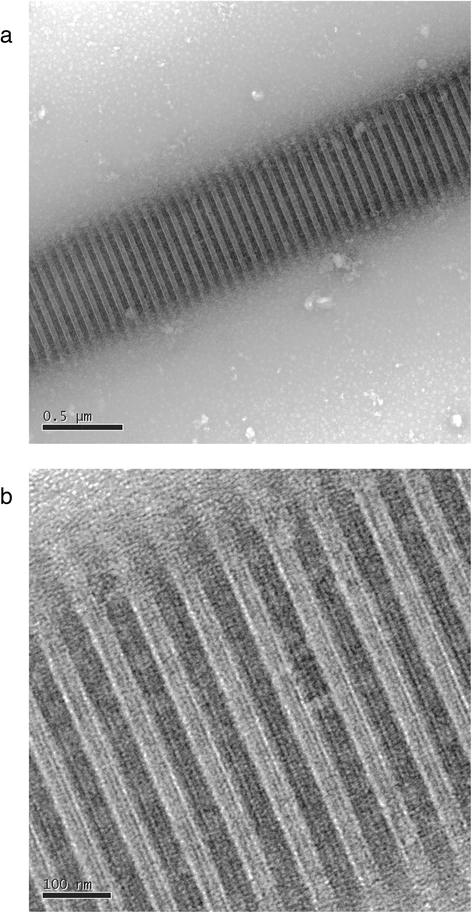Recombinant Collagen Transmission Electron Microscopy (TEM) Analysis Service
Recombinant Collagen Transmission Electron Microscopy (TEM) Analysis Service refers to an analytical service that utilizes transmission electron microscopy to observe the morphology and analyze the ultrastructure of recombinant collagen samples. This service is applicable not only to basic research but also to product development and batch-to-batch consistency evaluation.
Recombinant collagen, as a substitute for native collagen, has gained wide application in tissue engineering, biomedical materials, and regenerative medicine due to its superior batch consistency, lower immunogenicity, and controllable structural modifications. Its functional performance largely depends on the integrity of the collagen triple-helix structure and its nanoscale assembly behavior, including fibrillogenesis capacity, crosslinking status, fiber diameter, and distribution.

Wieczorek A. et al. BMC Biotechnol. 2015.
TEM offers spatial resolution at the sub-nanometer level, making it an ideal tool for studying the ultrastructure of recombinant collagen. TEM enables direct visualization of collagen fibril morphology, periodic banding patterns (such as D-periodicity), and aggregation states, providing critical support for structure–function relationship studies and product quality control.
Utilizing techniques such as negative staining and ultrathin sectioning, MtoZ Biolabs provides Recombinant Collagen Transmission Electron Microscopy (TEM) Analysis Service to systematically characterize the ultrastructural features of collagen, supporting structural verification and consistency assessment in both research and industrial applications.
Analysis Workflow
The workflow of Recombinant Collagen Transmission Electron Microscopy (TEM) Analysis Service mainly includes:
1. Sample Preparation
Collagen samples are diluted or reconstituted as required, with optional dialysis purification for enhanced quality.
2. Grid Preparation
Samples are applied onto copper grids or glass slides using drop casting, embedding, or sectioning techniques.
3. Negative Staining or Cryo-treatment
Appropriate staining agents (e.g., phosphotungstic acid) are used for negative staining, or cryo-preservation is employed to maintain native structure.
4. TEM Imaging
High-resolution images are acquired under multiple magnifications through TEM scanning.
5. Image Analysis and Data Integration
Fibril diameter and D-band periodicity are quantitatively measured, and a comprehensive structural evaluation report is generated based on the acquired images.
Service Advantages
1. Advanced Analysis Platform: MtoZ Biolabs established an advanced Recombinant Collagen Transmission Electron Microscopy (TEM) Analysis Service platform, guaranteeing reliable, fast, and highly accurate analysis service.
2. One-Time-Charge: Our pricing is transparent, no hidden fees or additional costs.
3. Customizable Protocols: Staining and sectioning strategies can be tailored based on sample morphology and specific client requirements.
4. Experienced Team: Our team brings years of expertise in ultrastructural protein analysis and is well-versed in handling diverse collagen sample characteristics.
Sample Submission Suggestions
Sample Types: Compatible with collagen solutions, lyophilized powders, collagen membranes, or embedded materials.
Buffer System: Avoid high-salt, strong acid/base conditions, heavy metals, or high-viscosity components.
Shipping Conditions: Ship under cold chain conditions; dry ice or 4°C ice packs are recommended.
Special Notes: For pre-formed scaffolds or composite materials, please specify the preparation method and intended imaging targets in advance.
Applications
Example application scenarios of Recombinant Collagen Transmission Electron Microscopy (TEM) Analysis Service include:
Structural Confirmation: Verifying the formation of the triple-helical conformation and fiber self-assembly capability.
Product Quality Assessment: Monitoring the impact of different batches or manufacturing processes on structural integrity.
Material Performance Evaluation: Assessing nanostructural characteristics under various crosslinking methods or buffer conditions.
Drug Delivery Development: Examining whether the microstructure of collagen-based carriers meets targeted release requirements.
Tissue Engineering Applications: Validating whether the nanoscale structure of scaffold materials supports biological functionality.
Deliverables
1. Comprehensive Experimental Details
2. Materials, Instruments, and Methods
3. Quantitative Data on Structural Features
4. Professional Analytical Report
5. Raw Data Files
6. Customized Reports Available Upon Request
Related Services
Recombinant collagen structure characterization service
Fourier Transform Infrared Spectroscopy Characterization Service | Recombinant Collagen
How to order?







